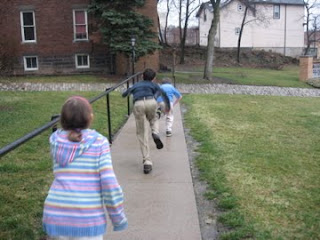As a homeschooler, it’s very difficult to let go of books. Some of the best homeschool support and reference books aren’t typically available in the library. Curricula specific to homeschoolers is hardly ever available. The same goes for Catholic books, both fiction and non-fiction. Those are the main categories that I purchase the most and have the hardest time purging. And to be honest I looooooove the look, feel, even the smell of a good book in my hands. I’m attached.
This is a tough purge but I’m applying 4 criteria.
1) Is the resource readily available at the library? If so, I don’t need it.
This standard helped me purge books like specific animal books (polar bears, bats, lions, etc.), some books about weather, planets, that kind of thing. This was easier to do if I decided that the quality of the book wasn’t that great.
2) Have I used the resource often or within the past 2-3 years? (I think for other things one year is a good limit but with books, we often come back to a topic or time period a few years later as the younger kids revisit it ). If we did study the subject matter that the book covers, did we use this particular resource? If not, bah-bye.
3) Does the book have a schizophrenic quality. You know the kind, you open it and are assaulted with scads of pictures or drawings all over the 2 page lay-out with blurbs or captions for each small vignette.
Most Usborne and DK books are formatted in this way and some are good but generally, they give me a headache just looking at them and I think that presentation can be overwhelming. Come to think of it, most of the textbooks that the schools use have this format which is why I don’t use them. Sensory overload, which is not what I’m looking for at this point. Less is more in this regard, too. I won’t get rid of books like this if the kids have actually used and enjoyed them, though.
4) Do I need to apply the principles of detachment and trust? Abby Sascer has a great ebook available here in which she replaced the term decluttering for detachment. There’s plenty of scriptural support for this principle and she makes a good case for it as well. I realize that if I don’t detach from my stuff, including books, I’m not going to achieve order in my home. Things aren’t totally chaotic here, far from it but there are things that we have to simplify in order to focus on the things that matter. The problem is that stuff gets in the way of even knowing what matters. “Trust” applies to letting go of resources that the kids likely won’t use for a few years. Here, I’m dispensing with the “we-might-use-it-some-day” mentality. It takes trust to tell myself that if the kids are studying that particular topic in 2 or 3 years, then I will have the resources to provide what they need and most likely it will be a better fit.
Finally, it might seem wasteful, but I decided to recycle or donate books whose pages are yellowing, staple bound (like cheap scholastic books) and any books that have seen better days. I think holding junky books detracts from the innate pleasure of reading. No matter how classic the story is, if the book is beaten up, it’s getting chucked.
Now the debate about what to do with all of these books. Some will most definitely go to the library. I can offer homeschooling friends a look-see, but I so hesitate to clutter up their bookshelves. (Any of my friends reading can shoot me an email-trust me, you probably don’t want or need what I’m getting rid of). I may take them to the used book sale at our local homeschool conference next week, but again, that’s a lot of energy. I think I’ll have more tolerance for expending energy on “stuff” after lent. I’ve been toying with the idea of letting my older 2 children list books on half.com. Sort of like a mini-business. They can enter them, price them, prepare them for mailing and I can get them to the post office.
I’ll let you know how this is going as I work on this area of clutter in the house.





